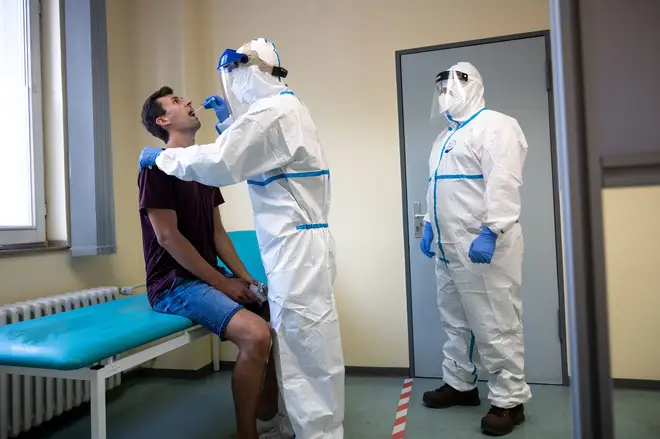
Richard Spurr 1am - 4am
25 August 2020, 11:18 | Updated: 25 August 2020, 11:33

First case of patient reinfected with Covid-19 discovered: A professor explains what this means
This professor insisted the first patient confirmed to have caught coronavirus twice does not affect the effectiveness of a potential vaccine.
Scientists in Hong Kong are reporting the case of a healthy man in his 30s who became reinfected with Covid-19 over four months after his first bout.
They say the genome sequencing shows he picked up a different strains of the virus, making it the world's first proven case of reinfection.
But Professor Peter Openshaw told LBC: "It's an unusual case, he didn't have any symptoms the second time but he did have quite a high viral load so he was -- the virus was growing inside his pharynx, inside his nose, but he didn't have any symptoms."
Professor Openshaw noted that the patient must have had some antibody response, as Covid-19 didn't reach his lungs but was highly concentrated in his sinus.
Nick wondered how this case would interest the medical world in their response to the pandemic.
"I don't think it means the vaccines aren't going to work, we need to know what sort of immunity protects different parts of your lung and nose," insisted the virologist.

"It looks like there was some protection against getting way more severe symptoms because it didn't go down into his lungs," but Professor Openshaw warned that "it's worrying that he was shedding virus at quite a high level with this second infection."
Nick wondered what this means for the production of a vaccine, but Professor Openshaw assured that this story is further evidence of how a vaccine is needed.
"Vaccines are well tested to generate high levels of antibodies," he noted, adding that "the thing which this chap lacked was a good level of antibody response.
"It may be that there will be few people that won't develop good antibody response to either infection or vaccination but, you know, the fact that he did develop an antibody response eventually means it's quite likely he would respond to a vaccine and he'd have been protected if he'd had one."
Listen & subscribe: Global Player | Apple Podcasts | Google Podcasts | Spotify

